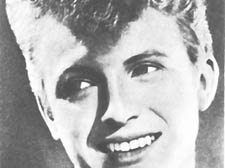|
|
 |
| |
Bermondsey boy to rock ’n’ roll legend
William Hall follows the early years of Tommy Steele, soon to be Britain’s first home-grown rock ’n’ roll star
HE was born Thomas Hicks, but that isn’t the sort of name which is going to sell records, is it? Or so his backers thought. So they changed it to Tommy Steele. The Bermondsey Boy’s story is a vivid account of life that began in the hard lane, one from which he eventually scrambled to forge a new name for himself and become a wing-a-dingin’, rock ’n’ rollin’ household legend.
The fact that he only changes his name on Page 243 – out of 310 – and that after a stint as ‘Chick Hicks’ with a country-western group called ‘Sons of the Saddle’ – is an indication that this book is about the early years rather than the later ones, when he would find an international film audience with Half a Sixpence in 1967 and Finian’s Rainbow a year later, starring opposite Fred Astaire, no less, and directed by Francis Ford Coppola.
But what exuberant early years they were, and Tommy tells it with all the Cockney zest he put into his performances when he finally picked up a guitar and took to the boards to discover his true forte in life.
Born in South-east London in December 1936, son of a racing tipster and a mother who worked part-time in a box factory, Tommy takes us on an exhilarating journey via the Blitz and the final war years when whole streets disappeared without warning from the dreaded V2 rocket, to his days as a cabin boy on luxury liners ploughing across the Atlantic in the ’50s.
Intelligently written, with evocative turns of phrase on every page, Tommy charts his progress “from sailor to star” with gutsy humour.
Seaman Thomas Hicks signed on for duty aboard the SS Scythia at the age of 15, earning £2.25 a week, and proved popular from the start. As they left Southampton “the band played, the streamers stabbed the air like a mass of coloured lizard tongues.” Wonderful stuff. Whoever would have thought it from the singer of Little White Bull?
On his first voyage across a stormy Atlantic to Quebec, Tommy was so seasick he spent all night sitting under a shower to wash away the nauseous evidence. Yet when he finds land, and the nearest bar with his shipmates, all is forgotten as he comes face to face with “a real live juke box, the lights running round its hand-painted pictures of palm trees, and its loudspeaker covered with carved hula girls and Doris Day singing Sugarbush.
He adds: “The list of titles ran along the machine’s front like rows of gnashing teeth. It drew me like a magnet.” Thus is our first hint that music might become the saviour of Tommy’s soul, as well as his stomach.
He recalls a chilling moment one dark November night in the north Atlantic when his ship struck another vessel in the “silent world of the iceberg, close to where the Titanic sank,” as the passengers huddled in life-jackets on deck.
“The combined condensation of their cold breath seemed to compete with the mist wafting in from the sea. Above us the ship’s horn blew ominously at regular intervals. Again and again the Titanic came back to me.” They limped back to Quebec, where he was allowed to send a telegram home: “Dear Mum. Still alive.”
Tommy was promoted into the restaurant, and given the bonus of the job of ship’s masseur, complete with $20 tips. His story is peppered with outlandish characters such as the menacing Mr Manny – “large and swarthy with a cigar jammed into his folding jowls” – and his Mafia boss Mr Cicci who came in for a session: “Are you da guy who gives da rub?” When they reach Havana they try to get “the kid” to lose his virginity at the hands of a pair of Cuban showgirls, but – “I decided my cherry was for giving, not taking!”
Meantime Seaman Hicks had learned to play the guitar in his leisure hours aboard ship, and once back in Blighty found himself drawn to the coffee houses of Soho when skiffle was taking hold.
In particular the Two Is in Old Compton Street, where he became its star resident entertainer. Backed by ‘the Clan’ – namely agent Larry Parnes, manager John Kennedy (who had changed Tommy’s name), with Lionel Bart writing the lyrics and Mike Pratt the music – he took off like a rocket, with hits like Rock with the Caveman and Singin’ the Blues soaring into the charts.
The story ends at the start of the ’60s, with Tommy top of the tree and the world at his feet. One suspects a sequel in the pipeline.
The tree may have withered a little in recent years, but one thing is certain: the Bermondsey Boy never will.
|
 |
 |
|
 |
|


